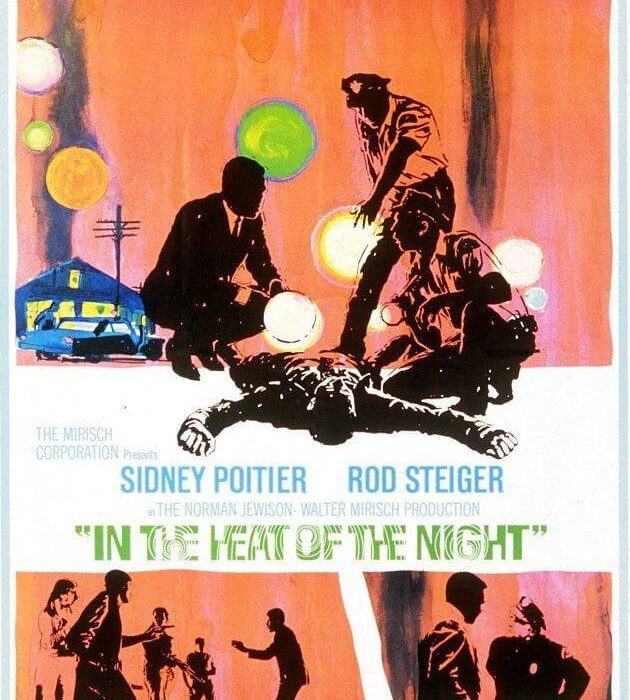Starring: Sidney Poitier, Rod Steiger, Lee Grant, Larry Gates and Beah Richards
Rated: Not Rated Crime/Drama/Mystery
This film, released by United Artists, is a murder mystery couched in racism; it was based upon the Edgar Award-winning 1965 novel of the same name authored by John Ball. Filmed during the Civil Rights Movement, Canadian director Norman Jewison wanted to present an anti-racist story where, despite difficulties, Blacks and Whites could successfully work together for a common cause and solution.
Set in 1966 in the fictional town of Sparta, Mississippi (there is an actual city of Sparta in Mississippi), the lead character, Virgil Tibbs (Sidney Poitier) of Philadelphia, is initially arrested and detained by racist, local police for the murder of Phillip Colbert, a wealthy Chicago industrialist. Colbert had recently relocated to Sparta to build a factory. Upon questioning by the police chief, Bill Gillespie (Rod Steiger), it is discovered that Tibbs is a leading Philadelphia homicide detective. With confirmation provided by Tibbs’ own police chief, who “suggests” that Tibbs assist in solving the case, the two law enforcement officers struggle, professionally and personally, to get to the truth and attain justice.
Despite the racial tensions onscreen and in reality, the film was a box office hit and received critical acclaim. In the Heat of the Night was the recipient of numerous awards, such as 5 Academy Awards (1967), including “Best Picture” and “Best Actor” (Rod Steiger). Scenes that were especially pivotal are Tibbs’ clash with Gillespie regarding Tibbs’ name and Tibbs’ face-off with Endicott, a racist and wealthy entrepreneur. Both scenes, even specific lines quoted, have been memorialized in motion-picture pop culture.
United Artists released the Quincy Jones-created soundtrack. It featured musical artists such as Billy Preston, Rahsaan Roland Kirk and Glen Campbell. Most prominent on the soundtrack was Ray Charles, who, supported by his backup group, the Raelettes, sang the theme song. Charles’ track would make its mark on the music charts, placing #21 on the Hot Rhythm and Blues Singles and #33 on Billboard Hot 100.
Because of its box office success, the film would have two sequels, They Call Me Mister Tibbs (1970) and The Organization (1971). Author John Ball won the Edgar Award for “Best First Novel” from the Mystery Writers of America and continued to feature Virgil Tibbs as the protagonist in mystery novels, The Cool Cottontail (1966), Johnny, Get Your Gun (1969), Five Pieces of Jade (1972), The Eyes of Buddha (1976), Then Came Violence (1980) and Singapore (1986). The character is also featured in short stories published in Ellery Queen’s Mystery Magazine: “One for Virgil Tibbs” (February 1976); “Virgil Tibbs and the Cocktail Napkin” (April 1977); and “Virgil Tibbs and the Fallen Body” (September 1978). Published by Murder, California Style, the short story, “Good Evening, Mr. Tibbs” (1987), was the final piece written by Ball, as he passed the following year.
The book and film were further developed and converted into a television series of the same name (1988-1995), that was also award-winning. Starring Carroll O’Connor as Chief Bill Gillespie and Howard Rollins as Virgil Tibbs, both O’Connor received the Primetime Emmy Award for “Outstanding Lead Actor in a Drama Series” and Rollins received the NAACP Image Award for “Outstanding Actor in a Drama Series” in 1989. The series won the NAACP Image Award for “Outstanding Drama Series” in 1992 and 1993.
In 1997, In the Heat of the Night was selected by the Library of Congress for preservation in the United States Film Registry for being, according to the Library’s standards, “culturally, historically or aesthetically significant.”

